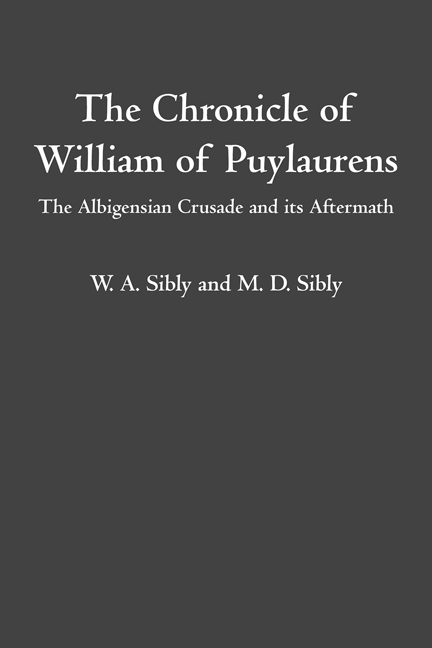C - The Treaty of Paris, 1229
Published online by Cambridge University Press: 14 May 2024
Summary
The text is that printed in HGL VIII, 883-93, and dated 12 April 1229
The document occupies ten columns of HGL VIII, about 3,000 words. It is written in good Latin, and for the most part clearly expressed, and in translating we have attempted to follow the Latin closely. Each item is set out with careful precision and in very elaborate detail, presumably to ensure that Raymond VII would have little chance of disputing the terms at a later time. Roquebert III, ch. 29, pp. 386–414, first provides a full French translation both of the preliminary document agreed at Meaux (HGL VIII, 878-83) and the treaty itself, and then proceeds to give a detailed analysis, inter alia pointing out that the terms of the treaty are much more stringent than those agreed at Meaux. In his chapter 30 he discusses the implementation of the treaty. The paragraph numbering follows Roquebert’s.
The treaty begins:
Raymond, by God’s grace Count of Toulouse, gives greetings in the Lord’s name to all those to whom this document may be presented.
Let all know that, whereas a state of war has for a long time existed between the Holy Roman Church and Louis, King of France, on the one part, and ourselves on the other, we now sincerely aspire to live in unity with the Holy Roman Church and remain loyally devoted to the service of our lord the King of France; and have made every effort, in person and through the agency of others, to ensure the maintenance of the peace which has been arranged between the Holy Roman Church and the King of France on the one part and ourselves on the other part.
[1 and 2] We therefore promise Romanus, Cardinal-deacon of St Angelo, legate of the Apostolic See, in the name of the Roman Church, that we will unto death remain faithful to and loyally support the Church and our lord Louis, King of France; and that we will always use every endeavour to expel from the territories which we or our people hold (or may hold in future) heretics and their believers, supporters and receivers; in this not sparing neighbours, vassals, kinsfolk or friends. We will also purge these territories of heretics and the filth of heresy, and will similarly help to purge the territories which the King may hold.
- Type
- Chapter
- Information
- The Chronicle of William of PuylaurensThe Albigensian Crusade and its Aftermath, pp. 138 - 144Publisher: Boydell & BrewerPrint publication year: 2003

